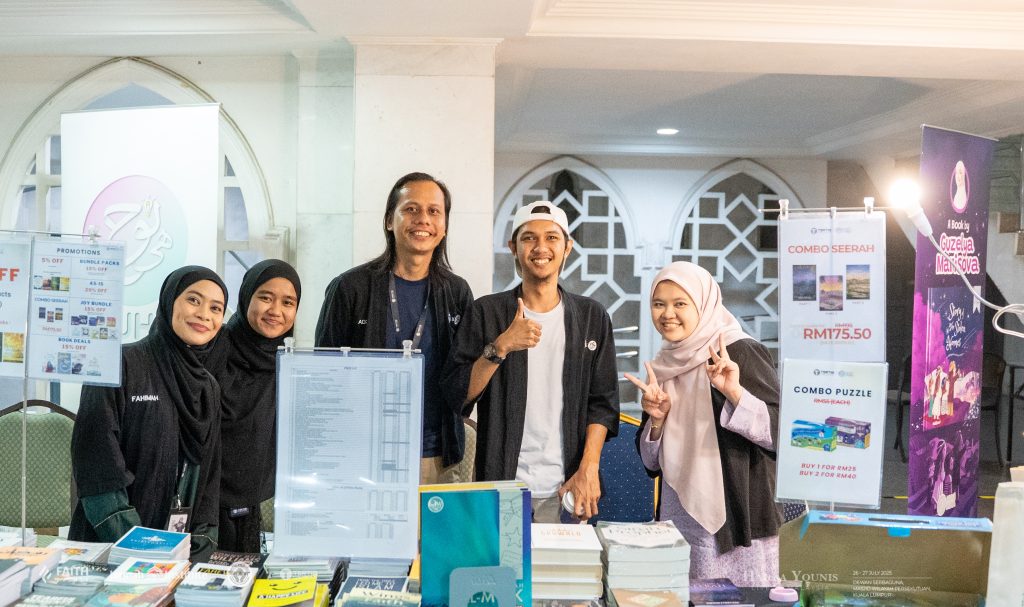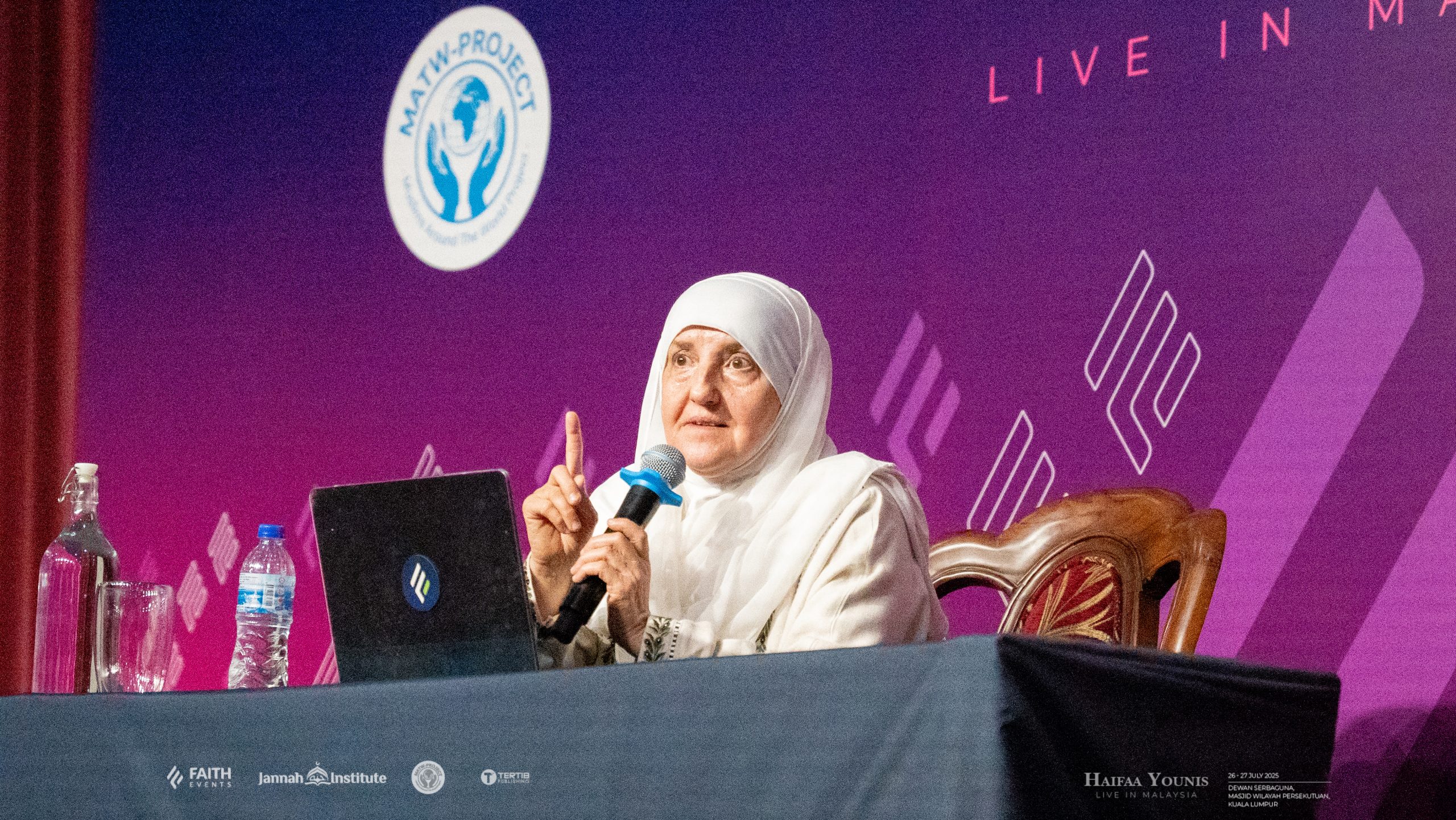Previously, together with the seekers of knowledge, we had the opportunity to gather in Kuala Lumpur for 2 transformative days with Dr. Shaykha Haifaa Younis, whose words struck the hearts of many and opened new pathways of spiritual reflection. Organised by Faith Events and supported by Tertib Publishing, the sessions offered a rich blend of Qur’anic insights, emotional healing, and actionable faith practices, especially for modern Muslim women.
Day 1: From Eve (a.s.) to Maryam (a.s.)
The first day session with Dr. Haifaa took us through divine narratives of women in the Qur’an beyond the commonly mentioned figures like Hawa (a.s.) and Maryam (a.s.). Dr. Haifaa reminded us that these weren’t just historical stories but living role models, etched in revelation to serve as spiritual signposts for us today.
The Silent Strength of Hawa (a.s.)
In Surah Al-Baqarah, we’re introduced to Hawa (a.s.) not by name, but through her story. What’s often misunderstood is the idea that Hawa (a.s.) alone was responsible for the slip in Jannah. Dr. Haifaa reminded us that Allah (s.w.t) refers to both Adam (a.s.) and Hawa (a.s.) as the ones who ate from the forbidden tree. The blame is shared. The lesson? Accountability is mutual, and growth begins with acknowledgement, not shame.
The Spiritual Nobility of Maryam (a.s.)
Maryam (a.s.) was not a prophet, yet Allah (s.w.t.) chose to name an entire surah after her. Why? Because honour in the Qur’an is not about the title but devotion. She displayed unshakeable sabr and tawakkul during one of the most trying times of her life: carrying Prophet Isa (a.s.) without being touched by a man. Dr. Haifaa beautifully emphasised how Maryam’s (a.s.) mihrab became a space for divine provision because her worship was silent, sincere and constant.
From the Palace of Fir’awn: Asiyah (r.a.)
Another remarkable figure was Asiyah (r.a.), the wife of Fir’awn, who bore unimaginable oppression yet turned to Allah (s.w.t.) with unbroken hope. Though married to one of the worst tyrants in history, her unwavering iman became her fortress. Dr. Haifaa shared how Asiyah’s (r.a.) struggle taught us that marriage is not your final destination, but your faith is. What matters is the righteousness you uphold, regardless of who surrounds you.
Day 2: Unlocking the Joy of Devotion
The second session moved from role models to reclaiming the joy of ibadah. How often do we pray, fast, or do good deeds out of duty rather than desire? Dr. Haifaa explored this question with thought-provoking clarity.
Worship with Hearts, Not Just Limbs
“Do we really know Allah (s.w.t.), or do we just know Him?”
Dr. Haifaa stressed that knowing Allah (s.w.t.) is the first key to joyful devotion. We begin with purifying our eyes: how we look at the Qur’an, how we reflect on creation, and how we see the signs of Allah (s.w.t.) all around us.
“The first thing that will change the way you look at salah is knowing who you are: a servant of Allah (s.w.t.).”
Worship should feel like love, not obligation. Just like we get excited to share about something we enjoy (like ice cream or dessert), we should strive to taste the sweetness of faith (halawatul iman) and speak of salah with the same enthusiasm.
Devotion is a Process, Not Perfection
The key takeaway? Your journey to Allah (s.w.t.) doesn’t need to be perfect. It just needs to be consistent.
You may not feel strong now, but if your heart wants Allah (s.w.t.), He will make a way. The process of becoming spiritually rooted takes time, and Allah (s.w.t.), in His generosity, responds when we show Him sincerity, no matter how small.
Timeless Truths
Dr. Haifaa shared countless perpetual lessons from this 2-day talk. Here are some soul-shaking reminders she left us:
- You can cry, but for the right things.
Don’t cry over the dunya, cry for something that brings you closer to Allah (s.w.t.). - Communication with Allah (s.w.t.) is the most sincere form of healing.
Raise your hands with humility. Come to Him as a beggar, not with entitlement. - The one who truly loves Allah (s.w.t.) will not disobey Him.
Love and obedience walk hand in hand.
Books, Barakah and Beyond

Throughout both days, attendees were also able to browse through Islamic books at the Tertib Publishing booth, featuring new releases and classics alike. From reflections on the Prophets to books on self-purification and family life, we offer them all. It was more than a book sale; it was a community moment. Attendees connected, discussed and walked away not just with books but with tools for spiritual transformation.
“Ya Allah (s.w.t.), use me.”
Perhaps one of the most poignant du’a’s Dr Haifaa shared was:
“Ya Allah, use me, and don’t replace me.”
May we all strive to become people whom Allah (s.w.t.) chooses to use for good and never replaces due to heedlessness. May our devotion deepen not out of fear but out of love so immense we fear losing His closeness.




